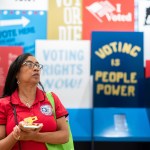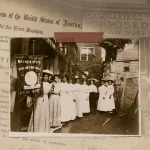The Supreme Court’s decision on Thursday to make it easier for states to enact voting restrictions comes at a “perilous moment” when many Republican-led states are pursuing new laws that will “predictably deprive members of minority groups equal access to the ballot box,” Justice Elena Kagan writes in a scathing dissent.
In a 6-3 ruling by the court in a case called Brnovich v. Democratic National Committee, the court’s conservatives, led by Justice Samuel Alito, sided with Arizona that two of its laws related to the casting and collection of ballots did not violate a key provision of the Voting Rights Act, a 1965 law prohibiting racial discrimination in voting.
The dissent offered by Kagan, who was joined by fellow liberal Justices Stephen Breyer and Sonia Sotomayor, reads as a civics lesson about the myriad of ways that White men, from before the Civil War until the present, have had advantages at the ballot box — and the “predictable consequences” that will befall Black, Latinx and indigenous voters after their colleagues’ “tragic” decision to further weaken the law meant to protect them.
“If a single statute represents the best of America, it is the Voting Rights Act. It marries two great ideals: democracy and racial equality,” Kagan writes.
“If a single statute reminds us of the worst of America, it is the Voting Rights Act. Because it was — and remains — so necessary,” she adds.
Leah Litman, a constitutional law professor at the University of Michigan, agreed with the dissenting justices that Thursday’s ruling “all but eviscerated the remaining protections” of the Voting Rights Act. It provides conservative courts with a “set of weapons” to “wipe out” future claims that voting laws have discriminatory impacts, she said.
The Brnovich v. DNC case concerns two Arizona election laws: one that invalidates ballots cast by voters in incorrect precincts even if they are eligible to vote generally; and another that all but ended the practice of third parties collecting and dropping off batches of ballots during early voting. The DNC sued in 2016, saying both laws have a disproportionate impact on the state’s racial minority voters that violated Section 2 of the Voting Rights Act. A trial judge sided with Arizona, the DNC appealed, and the full U.S. Court of Appeals for the Ninth Circuit reversed, prompting Arizona to appeal to the Supreme Court.
States have passed a slew of voting laws in recent years that, until the Supreme Court’s 2013 ruling in Shelby County v. Holder, would have required “preclearance” by the Justice Department if they were in a state or locality with a history of racial discrimination.
The court’s conservative majority found in the Shelby County case that Congress had not appropriately updated the formula used to determine which areas were subject to preclearance when the Voting Rights Act was last renewed in 2006. The preclearance provision, formally called Section 5, was tossed out. Civil rights attorneys and voting right advocates have since relied on Section 2 to challenge potentially discriminatory voting laws.
The Voting Rights Act’s Section 2 prohibits laws and policies that intentionally discriminate on the basis of race, as well as laws that have a disproportionate impact on voters of color, regardless of intent.
“Today, the U.S. Supreme Court handed down a decision that will undoubtedly restrict the right to vote, and in particular, for voters of color,” said Vice President Kamala Harris, who was California’s 32nd attorney general.
“This is the second time in the last eight years that the Supreme Court has dismantled crucial protections of the Voting Rights Act,” added Harris, whose White House portfolio includes voting rights.
The court’s conservative justices on Thursday “listed a set of factors” that must be met to prove a Section 2 claim that will make it “exceedingly, if not prohibitively, difficult for plaintiffs to win these challenges,” Litman said.
“The mere fact there is some disparity in impact does not necessarily mean that a system is not equally open or that it does not give everyone an equal opportunity to vote,” Alito writes for the majority.
Kagan counters that the language in the Voting Rights Act is clear: “Courts are to strike down voting rules that contribute to a racial disparity in the opportunity to vote, taking all the relevant circumstances into account.”
It is these relevant circumstances that Kagan discusses at length in her dissent, which describes how “drafters of the Voting Rights Act understood that ‘social and historical conditions,’ including disparities in education, wealth, and employment, often affect opportunities to vote.”
For most of the century after the Declaration of Independence was signed in 1776, the democratic tenets it sets out, including the right to vote, only applied to White men, Kagan writes, saying the “earliest state election laws excluded from the franchise African Americans, Native Americans, women and those without property.”
The Supreme Court’s 1857 decision in Dred Scott v. Sandford that citizenship rights did not extend Black Americans was its “most deplorable,” Kagan writes, adding that many states, particularly in the U.S. South, continued to suppress the Black vote through a “dizzying array of methods: literacy tests, poll taxes, registration requirements and property qualifications.”
In 1965, the year the Voting Rights Act overcame a Senate filibuster and was signed into law by President Lyndon B. Johnson — who had asked Congress to write the “goddamnedest toughest voting rights act that you can devise” — only 27 percent of eligible Black people in Georgia were registered to vote, only 19 percent in Alabama and just 7 percent in Mississippi.
Between 1965 and 1970, nearly as many Black people registered to vote in six states in the U.S. South as had registered in the entire 100 years preceding the Voting Rights Act’s passage, Kagan notes.
“Much of the Voting Rights Act’s success lay in its capacity to meet ever-new forms of discrimination … and for decades, Section 5 operated as intended,” Kagan writes, adding that between 1965 and 2006 the Justice Department blocked 1,200 voting laws it had found would have a discriminatory impact.
But in the years since the Shelby County ruling, states have passed dozens of laws, some of which previously may have been stopped before taking effect, and voters have thereby been disenfranchised, she writes.
Former President Donald Trump’s erroneous claims that voter fraud cost him the election have further fueled skepticism about our electoral process, and that skepticism has prompted elected officials in mostly Republican-led states to propose a flurry of new restrictions on voting this year that range from stricter identification laws to the removal of names from voter-registration lists.
As of June 21, 17 states had enacted 28 new laws that restrict voting access, including two more in Arizona, according to the nonprofit Brennan Center for Justice.
The previously passed Arizona laws at issue in Thursday’s ruling both disproportionately affected voting access for voters of color, the dissenting justices said, echoing claims made by the DNC, Arizona’s Democratic Secretary of State Katie Hobbs and voting-rights groups. Kagan notes that in 2016, Latinx, Black and Native American voters in Arizona were twice as likely to have their ballots discarded as White voters were.
Some Republicans in the U.S. Congress, Arizona’s Republican Gov. Doug Ducey and conservative-leaning advocacy organizations sided with Arizona’s Republican Attorney General Mark Brnovich.
In Arizona, some voters cast ballots at assigned precincts and others at county-wide voting centers. The state’s law invalidating otherwise valid ballots cast in the wrong precincts resulted in ballots cast by Latinx, Native American and Black voters being tossed out at higher rates. Arizona’s prohibition on ballot collection and submission by most third parties makes it disproportionately more difficult for the state’s Native American voters, who are more likely than White voters to live in remote areas that do not have access to the U.S. mail service.
“Make no mistake, it is not ‘very easy’ for Black, Latinx and Native Americans to vote in and beyond Arizona,” said Judith Browne Dianis, executive director of the Advancement Project, a liberal nonprofit focused on racial justice issues.
Alito opens the majority opinion by stating that “Arizona law generally makes it very easy to vote.”
In 2020, Joe Biden was the first Democratic presidential candidate to carry Arizona since Bill Clinton did in 1996, but he only beat Trump there by about 10,000 votes — critical to his victory was a coalition of women made up of energized liberals, Latinas, indigenous activists and disaffected suburbanites.
“That is fewer votes than Arizona discarded under the out-of-precinct policy in two of the prior three presidential elections,” Kagan writes in arguing that Arizona’s laws result in a “statistically significant” disparity.
“The court decides this Voting Rights Act case at a perilous moment for the nation’s commitment to equal citizenship. It decides this case in an era of voting-rights retrenchment — when too many states and localities are restricting access to voting in ways that will predictably deprive members of minority groups of equal access to the ballot box,” Kagan argues.
At the end of the dissent, Kagan notes that Congress, not the courts, should decide if and when Section 2 should be eliminated or otherwise reworked. The Voting Rights Act “confronted one of this country’s most enduring wrongs” and pledged to “give every American, of every race, an equal chance to participate in our democracy … that law, of all laws, should not be diminished by this court,” she writes.
The Brnovich decision comes just one week after a sweeping Democratic bill to protect and expand voting access stalled in the evenly split U.S. Senate, where most legislation needs 60 votes to overcome procedural hurdles, making a path forward unlear. Democrats are planning to hold a series of field hearings in the coming weeks, beginning in Georgia, which has enacted one of the most stringent new voting laws in the country.
Litman said the end of Kagan’s dissent is a message that “Congress has to pass a new law, because the court just gutted the one we have.”
“You need to pass a new law and you need to insulate it from being gutted or invalidated by this court, that is the only option on the table,” Litman said.








